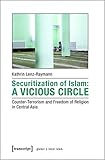Securitization of Islam : a vicious circle : counter-terrorism and freedom of religion in Central Asia / Kathrin Lenz-Raymann.
Material type: TextSeries: Global, local IslamPublisher: Bielefeld, Germany : Transcript, 2014Copyright date: ©2014Description: 1 online resource (325 pages) : illustrationsContent type:
TextSeries: Global, local IslamPublisher: Bielefeld, Germany : Transcript, 2014Copyright date: ©2014Description: 1 online resource (325 pages) : illustrationsContent type: - text
- computer
- online resource
- 9783839429044
- 3839429048
- 9783837629040
- 383762904X
- Freedom of religion -- Asia, Central
- Political ideologies
- Politics and government
- Society and social sciences Society and social sciences
- RELIGION -- Christian Life -- Social Issues
- RELIGION -- Christianity -- General
- POLITICAL SCIENCE -- Political Ideologies -- General
- Freedom of religion
- Central Asia
- 261.72 23
- BV741 .L469 2014eb
- BE 8660
Diverse Islamic groups have triggered a "revival of Islam" in Central Asia in the last decades. As a result, there has been a general securitization of Islam by the governments: not only do they combat the terrorist Islamic Movement of Uzbekistan but also outlaw popular groups such as the Gülen movement. However, strong repression of religion might lead to radicalization. Kathrin Lenz-Raymann tests this hypothesis with an agent-based computer simulation and enriches her study with interviews with international experts, leaders of political Islam and representatives of folk Islam. She concludes.
Includes bibliographical references.
Introduction -- Features of Central Asian folk Islam -- Salafi Islam: social transformation and political islam -- Typology of Islamic groups -- History of politics and Islam in Central Asia -- General comparison of contemporary regimes -- Comparison of the contemporary role of religion in politics -- comparison of law enforcement -- Typology of religious and counter-terrorism politics -- Securitization theory: legitimacy in security politics -- Model description -- Model verification and validation -- Conclusions.
Print version record.
In English.
This work is licensed under a Creative Commons license
https://creativecommons.org/licenses/by-nc-nd/4.0/legalcode
This work is licensed by Knowledge Unlatched under a Creative Commons license
https://creativecommons.org/licenses/by-nc-nd/4.0/legalcode
Open Access EbpS

There are no comments on this title.